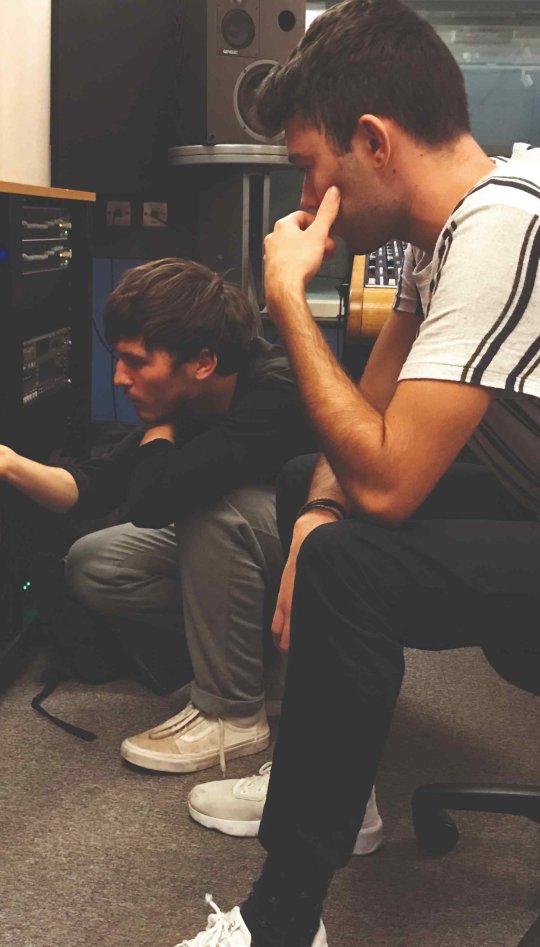
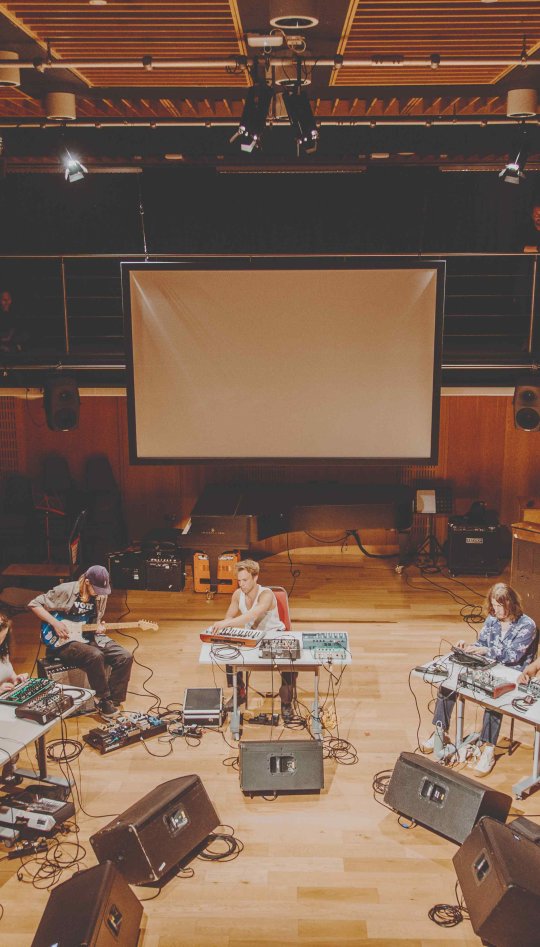
Creative Music Technology BA(Hons)
Develop the creative and technical abilities needed to thrive in the music and sound industries.
Course overview
Create music and sound for exciting and diverse platforms and media using analogue and digital technologies. With a focus on music production, electronic music and interdisciplinary working, we’ll support you to develop the creative, technical and business abilities to thrive in the music and sound industries.
Guided by expert academics and industry professionals, you’ll master your craft utilising our professional studios. You’ll collaborate with musicians and students from other creative disciplines, building a portfolio of projects that prepares you for professional life.
You will:
- Become an industry-ready artist with strong creative, technical and professional attributes
- Gain practical and academic expertise within music production, electronic music composition and interdisciplinary working
- Study in a vibrant performance centre with high-spec studio facilities and a wide range of industry standard hardware and software including PA systems, cameras and lights, and portable recording equipment
- Collaborate with musicians, filmmakers, gaming artists, dancers, animators and designers
- Gain business, marketing and entrepreneurial insight, boosting your employability
- Develop transferable skills such as project management, problem-solving and communication skills
Course details
On this Creative Music Technology degree, you'll have the opportunity to gain a BA(Hons) degree over three years or study Creative Music Technology BA(Hons) with a professional placement option.
This music technology degree supports your professional journey by giving you the essential technical and industry knowledge, as well as the opportunity to experiment in an inspiring and supportive environment, so that you can accelerate your career after university.
You'll develop essential skills in composition, critical listening and collaborative practice, learning to apply these skills to music production, sound design and electronic music.
You'll become immersed in the wider context of music and sound contexts and culture, and learn how to communicate your understanding as an individual and as part of a team. You'll also become industry-ready through developing your knowledge of music business practices such as copyright, intellectual property and contracts, and through increasing your awareness of equality, diversity, inclusion, sustainability and healthy working practices.
With technical and artistic guidance from staff and specialists, you will become equipped with foundational knowledge, skills and experience in music and sound theory, music production, sound design and electronic music.
You will receive small-group tuition to help you identify and work on your specialist creative practice, while gaining practical experience using industry-standard software and hardware tools and techniques. You will also develop your essay writing abilities through studying music and sound contexts and cultures.
Modules
Designing Sound
You’ll be immersed in the creative possibilities of sound design for different visual media, including film, TV, animation and games. Over the course of the module, you will be introduced to new concepts, techniques and workflows and encouraged to explore the ways in which audio can be sculpted to create new sonic forms.
Electronic Music
In this module you will develop a theoretical and practical understanding of contemporary electronic music tools, techniques and creative practices.
Expanding Musical Vocabularies
This module will introduce you to a range of musical terms, theories, techniques and notations before helping you to apply them in creative and practical scenarios.
Specialist Music Practice 1
In this module, you will increase your knowledge and skills in your area of specialist practice and develop co-creation, collaborative and communication skills through collective music making and studio practice sessions.
Music and Sound: Context and Cultures
You’ll examine key concepts and debates in music and sounds studies whilst thinking critically about the relationship between music, sound, and culture.
Studiocraft
You'll learn to record, edit, mix and master audio in a recording studio environment using microphones, audio interfaces, mixing desks and digital audio workstations (DAWs).
In your second year, you will expand your subject knowledge, focusing on both practical and academic areas including music business, multimodal creation, composition, immersive technologies and experimental performance.
You will continue to experiment in cutting-edge areas, push your creative potential and create a wider variety of work through collaboration and open assessment briefs.
Modules
The Art of Production
This module explores the role of the contemporary music producer. This involves collaborative and interdisciplinary working as well as technical and artistic knowledge and skills development. You will work creatively, acting as both composer and engineer.
The Business of Music & Sound
You’ll be introduced to intellectual property regulations and the subsequent risks of exploitation across multiple areas of the creative industries. You’ll learn the necessary business skills to work sustainably within the music and sound sectors with confidence.
Specialist Music Practice 2
Building upon the work undertaken in the Specialist Practice 1 module in your first year, you will continue to increase your knowledge and skills to further develop co-creation, collaborative and communication skills through collective music making and studio practice.
Music & Sound: Resonant Futures
In this module you will question and explore the relationship between music, sound, technology, context and culture in ways that seek to imagine and speculate on the future of music and sound.
Optional modules - Block 1
Immersive & Interactive Audio
You’ll be introduced to a range of technologies, techniques and applications of immersive and interactive audio. The module is highly interdisciplinary and relevant to film sound, game audio, digital arts and experience design.
Resounding: Situated Songwriting & Composition
This module encourages you to think about how your practice is entangled with various places—geographic, imaginary, speculative, utopian, abstract and psychological. It introduces you to new critical frameworks and artists who process complex issues like the Anthropocene, the internet, dark ecology and the climate crisis through their music.
Advanced & Experimental Performance
This module aims to develop your abilities in the art of musical communication, flow, interpretation, expressivity, experimentation and versatility in performance. You’ll be introduced to improvisational and creative techniques to advance your practical skills and ideas.
Voice and Listening: Life, People and Planet
The module will develop your vocal and listening skills alongside your creativity and in relation to an increased awareness of concepts in voice studies and relevant contemporary social, political and environmental themes.
Optional modules - Block 2
Composing Music for Media
You’ll develop a critical understanding of music-image relationships and conduct practical work across a range of media. You’ll also enhance your composition and production skills through being shown industry-standard workflows and techniques.
Session Musicianship
In this module you will develop an understanding of the skills, techniques, communication methods and working practices of session musicians in a variety of genres and contexts.
A/V Radical Artistry & New Media Aesthetics
This module unleashes the potential of multimodal creation, encouraging you to re-imagine your artistic identity by exploring the rapid acceleration and monumental shifts of the contemporary media landscape. You will explore the dynamic creativity of social media, vlogging, AI, TV, music videos, advertising, and graphic design.
Enterprise: Innovative Music Business Practice
Within the context of the ever-changing and shifting music business, this module enables you to approach your practice with agile, innovative, sustainable and ethical business skills and knowledge; from legal to financial, marketing to planning.
You can choose to take an optional professional placement after your second year on this three-year programme. Choosing this option will enhance your industry experience and skills while studying.
How you’ll study during your professional placement
You’ll spend time working in a professional context, as part of a business or organisation. This can be in one role, or up to three, and must be for a minimum of 24 weeks. You’ll develop in-demand workplace skills, deepen your insight into industry and grow your network of contacts, all of which could help you get ahead in your career after graduation.
Over the course of this year, you will complete one module whilst undertaking your placement and compile a reflective portfolio of your experiences. During this year you’ll be supported by the University employability team, with continued access to student support and wellbeing services and academic supervision from a named module leader.
The University will support students to find and apply for opportunities, but we cannot guarantee every student will be successful in securing a placement.
Your final year is geared towards solidifying your artistic and professional identity, knowledge, skills and networks in line with your chosen area of creative music technology specialism. You’ll develop your showcase portfolio, enhance your entrepreneurial practice skills and explore career options as you prepare to take your first steps into industry.
Modules
Music & Sound: Dissertation
In this module you will expand on your music and sound subject-based intellectual skills developed in your first and second years through an independently-driven written research project.
Professional Development
This module enables you to continue developing your specialist skills, contextual knowledge, experience and entrepreneurial mindset in preparation for the Showcase Portfolio module, careers and/or artistic practice beyond your degree.
Your Future
This module enables you to understand, develop, practice and analyse skills pertinent to your chosen career path in sustainable ways; both now and in the future. You will further develop legal, financial, marketing and digital skills that relate to specialist areas of the music sector and be able to critically analyse trends and future opportunities that relate to your career.
Showcase Portfolio
You’ll produce a professional portfolio of creative work that showcases your specialist skills and artistic practice developed over the last three years, ready to take to industry.
We regularly review course and module content to ensure our students receive a high-quality and rewarding academic experience. As such, there may be changes made to the curriculum which are not immediately reflected in the content displayed on our website. Optional modules may be updated to maintain the best experience. Any students or applicants affected will be informed of approved changes directly.
From module information to course aims and assessment criteria, discover the full course details:
"I think the biggest skill I've developed that will help me is being super comfortable in an industry-level space and getting in as much studio time as possible."
- Kalev Villem, Creative Music Technology BA(Hons) student
Facilities
The Academy of Music and Theatre Arts (AMATA) is a purpose-built live performance venue on Penryn Campus housing an assembly of flexible theatre spaces, performance, rehearsal and recording studios, a box office and exhibition areas. As a Creative Music Technology student, you’ll have access to:
Audio/recording equipment
From enhancing live performances to creating immersive music recordings, you'll be working with professional-standard audio equipment, including:
- Purpose-built sound studios incorporating the best analogue and digital technologies, including SSL and Audient consoles, fully accessible from your own laptop.
- Classic and contemporary synthesizers and outboard equipment.
- A wide range of professional studio software, hardware and one of the UK's largest collections of microphones in higher education.
- The SONVA-x 10.2 Genelec surround system for mixing and performance.
Rehearsal spaces
Our rehearsal spaces provide professional-standard facilities and equipment. Key features include:
- High-spec performance studio designed for acoustic music.
- High-spec studio designed for amplified music.
- Recording studio complex.
- Music practice rooms for bands and solo work.
- 12 practice rooms.
- 700m2 of fully sprung dance floors.
- Seminar, exhibition and display spaces.
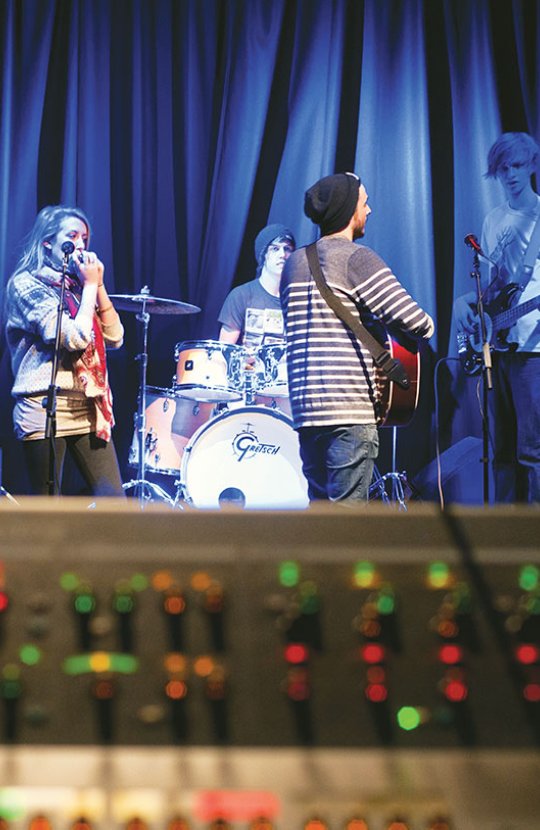
Virtual tour
Discover where you’ll spend your time as a student with our 360° tour, showcasing our facilities, accommodation, town and scenery.
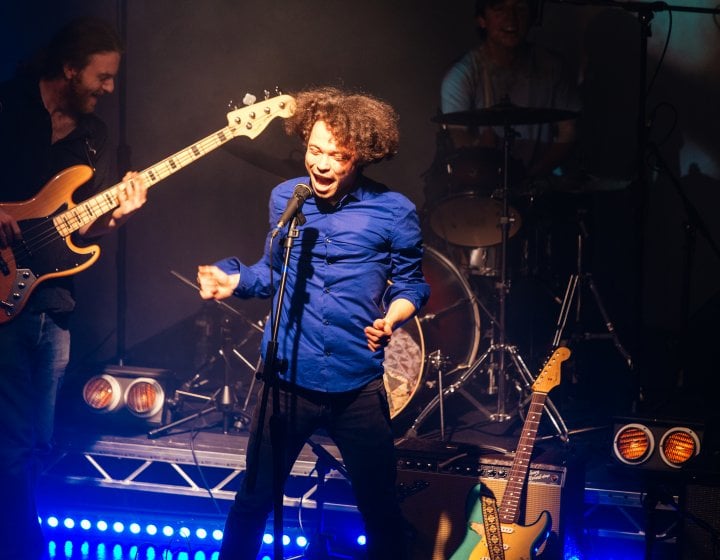
Performance Facilities
The Academy of Music and Theatre Arts (AMATA) is a purpose-built live venue housing an assembly of f...
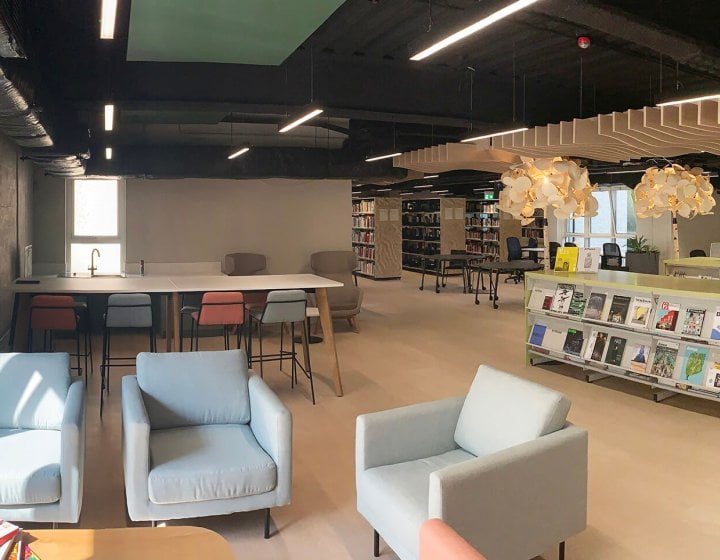
Library Facilities
Offering extensive collections, our two libraries provide a wealth of digital resources, magazines, ...

Sports Centre
Our Sports Centre, on Penryn Campus, includes a spacious gym with up to 90 of the latest, new statio...
Stories from our community
Explore student projects, graduate successes, staff news and industry insights
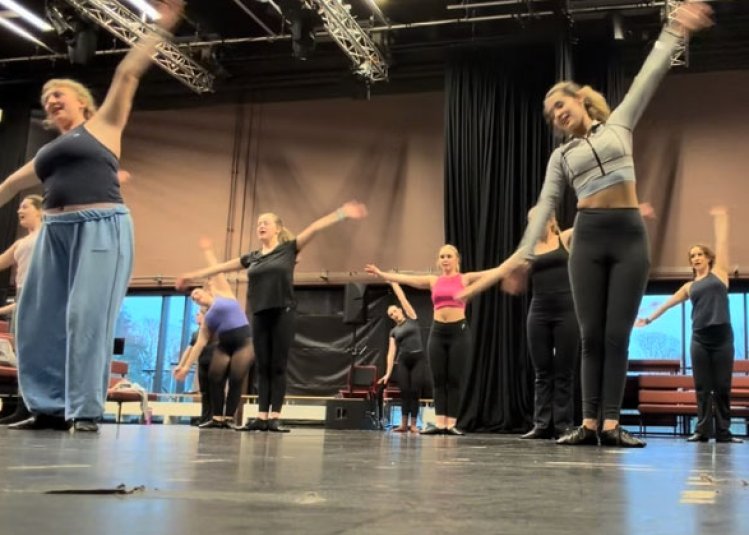
Day in the life of a Musical Theatre student
11 February 2026
BA(Hons) Musical Theatre student, Val takes us through a typical day of studying at Falmouth Univers...
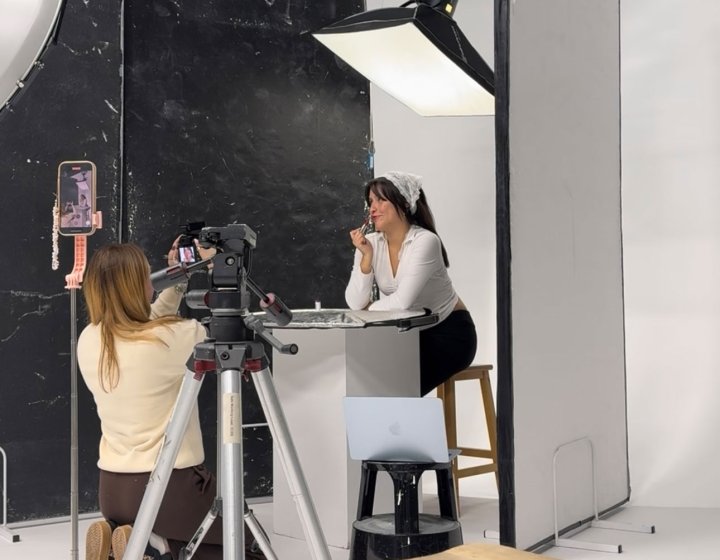
What I learned from collaborating at Falmouth
26 January 2026
Read how collaborating with other students has enriched Kat's learning experience.
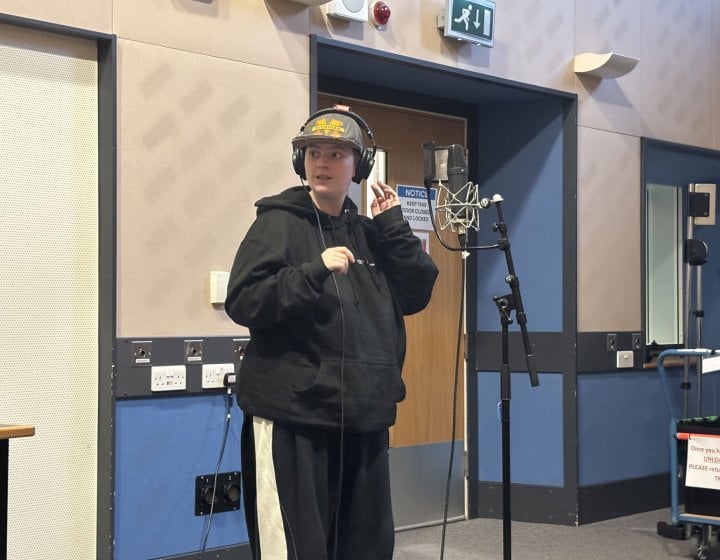
Ethan in the recording studio learning about recording songs/vocal reels
Why I chose to study Musical Theatre at Falmouth
08 January 2026
Discover why current student, Ethan chose to study Musical Theatre at Falmouth.

Falmouth students and lecturers collaborate with Hall for Cornwall to bring Christmas panto to life
17 December 2025
From the dress and accessories worn by the Dame in the show’s finale, to the visual effects disp...
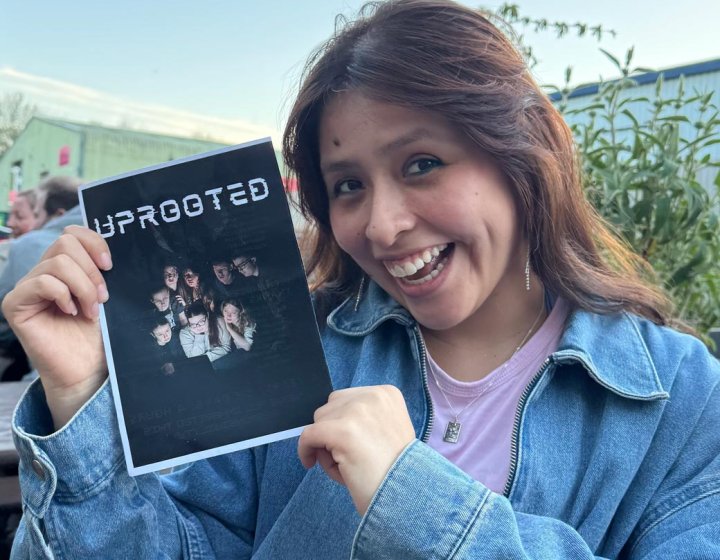
Why I chose to study Theatre & Performance at Falmouth
09 December 2025
Find out why Falmouth's Theatre & Performance degree stood out to current student, Kat.
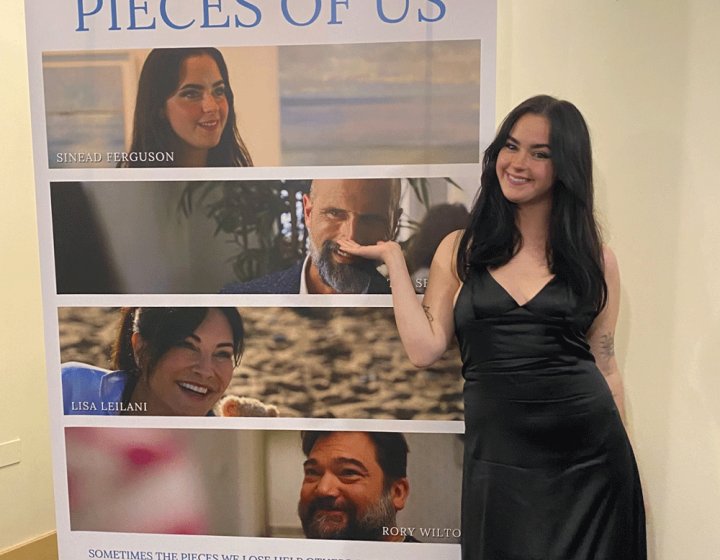
Acting graduate stars as female lead in feature film set in Cornwall
29 October 2025
After spending the summer of her second year on set of the Cornwall-based film Pieces of Us, Sinead ...
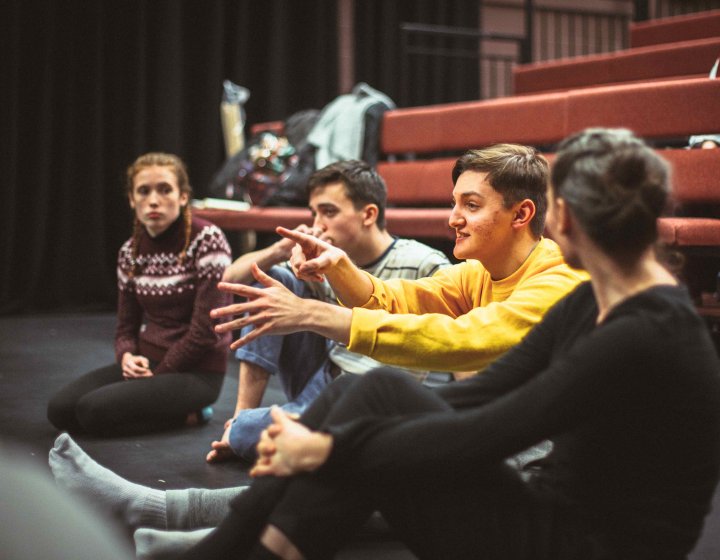
One take filming: what shows like Adolescence tell us about acting
21 October 2025
In the second episode of The Studio currently being released on Apple TV, Seth Meyers’ studio boss...
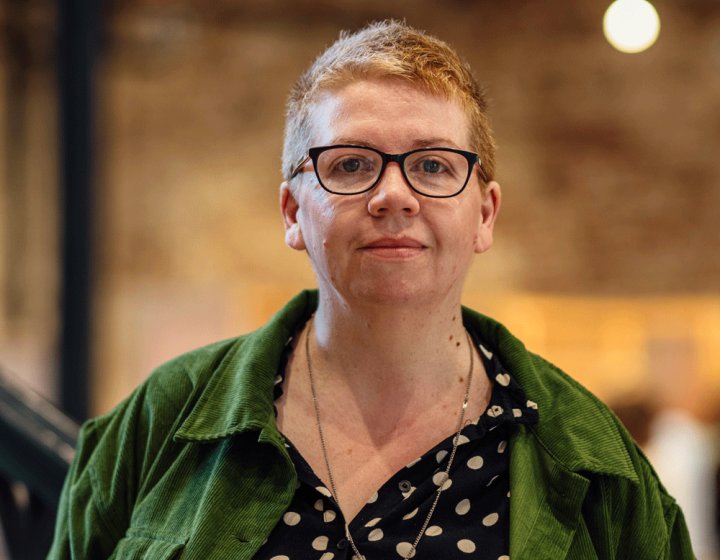
Acting lecturer brings new revival of Olivier Award-winning play to life as associate director
29 September 2025
Amanda Collins, one of Falmouth’s Acting BA lecturers, has spent the last two months working on a ...
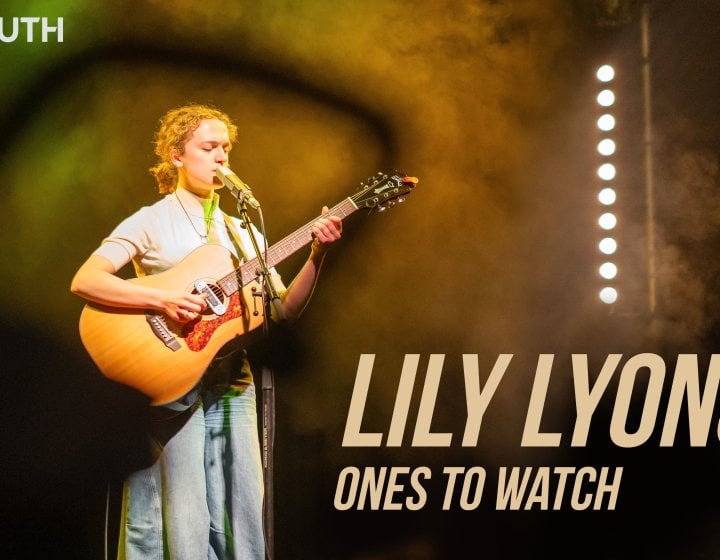
Popular Music alumna to release debut album on major label Fiction Records
10 September 2025
Singer songwriter and Popular Music BA alumna Lily Lyons is set to release her debut album Reopen th...
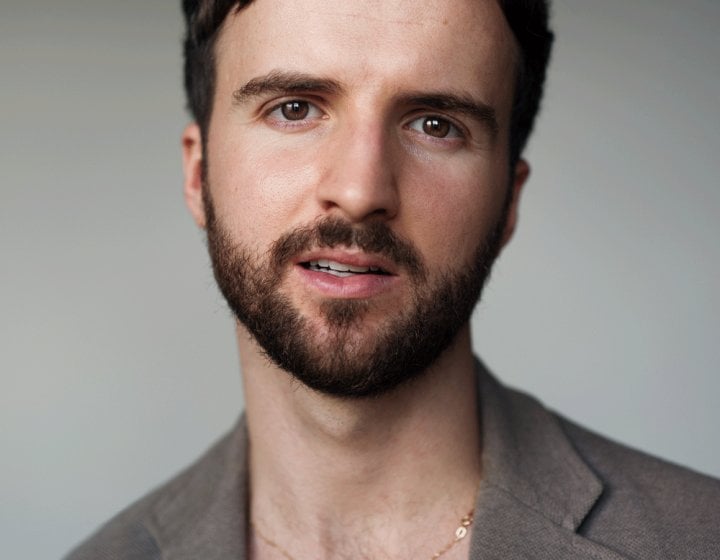
Acting alumni brings student project to world-renowned festival
01 July 2025
What began as a short film created during Piers Mackenzie’s final year at Falmouth has blossomed t...

Third year acting student is nominated for this year’s prestigious Spotlight Prize
13 May 2025
Chosen from a pool of hundreds of graduating drama students across the UK and Ireland, third year Ac...
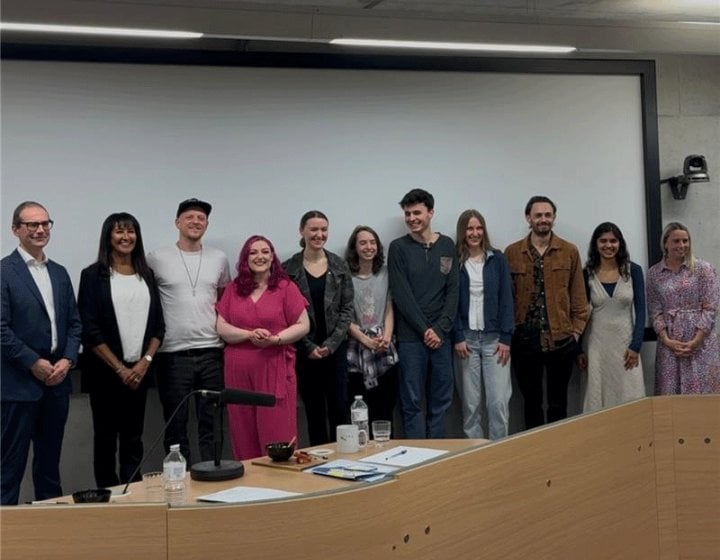
Falmouth’s Dragons’ Den: where students compete for a share of £6000
17 April 2025
The annual Dragons’ Den competition is an exciting event in the Falmouth University calendar. Held...
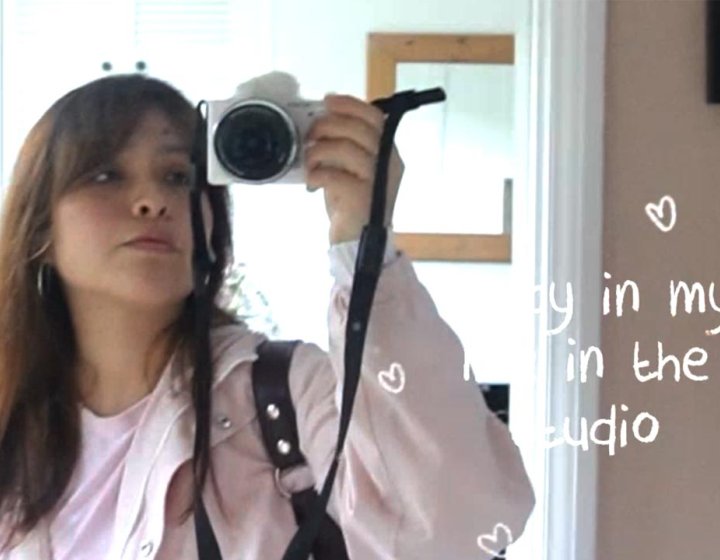
A day in the life of a Theatre & Performance student
16 April 2025
Student, Kat shows us a day in the studio where she's rehearsing for her final assessment.
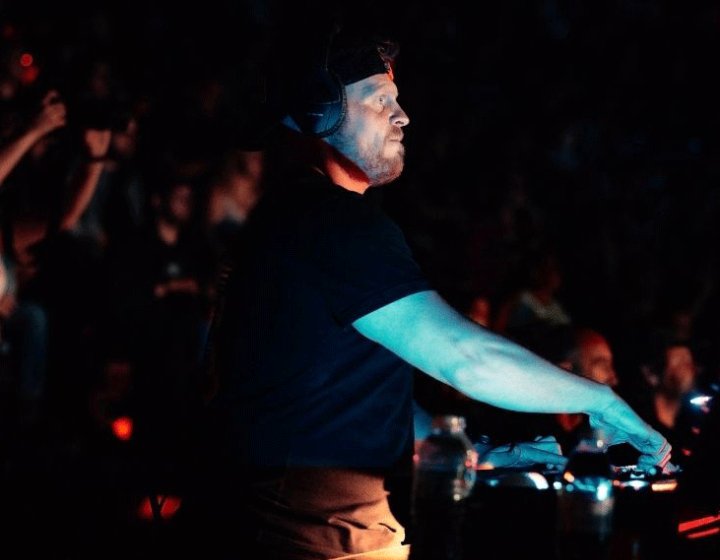
Graduate Ruairi Wakefield on touring with his musical heroes
12 March 2025
From lecture halls to international tour venues, Ruairi Wakefield went from applying to the Technica...
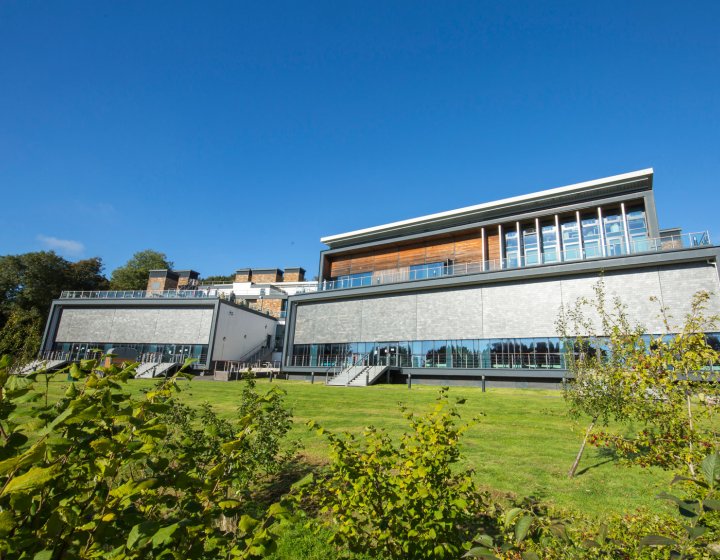
What is it like studying in the Academy of Music and Theatre Arts?
09 December 2024
In this blog, I aim to paint a picture of what life in AMATA (The Academy of Music and Theatre Arts)...

Acting graduate stars in new Edinburgh Fringe show
14 August 2024
Acting BA graduate Piers MacKenzie began his run portraying Daniel Radcliffe in Joshua Kaplan’s TE...
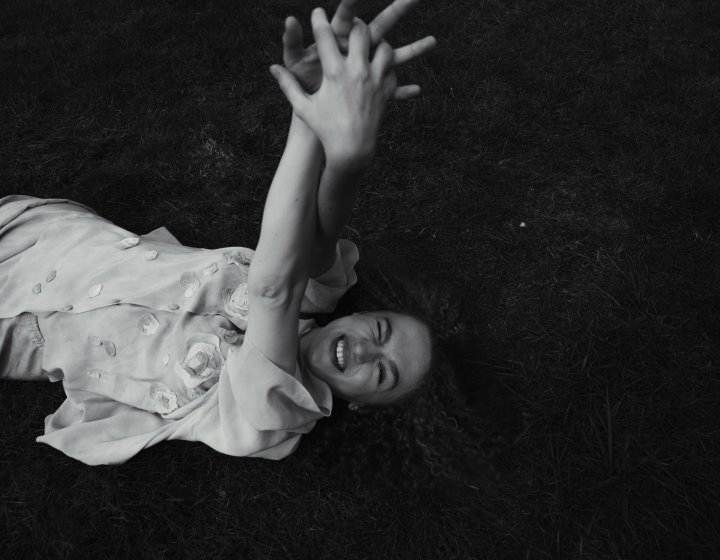
Credit: Sequoia Ziff
Popular Music graduate Lily Lyons signs to major label Fiction Records
27 June 2024
2024 has been quite the year for singer songwriter Lily Lyons, a 2018 graduate from Falmouth’s Pop...
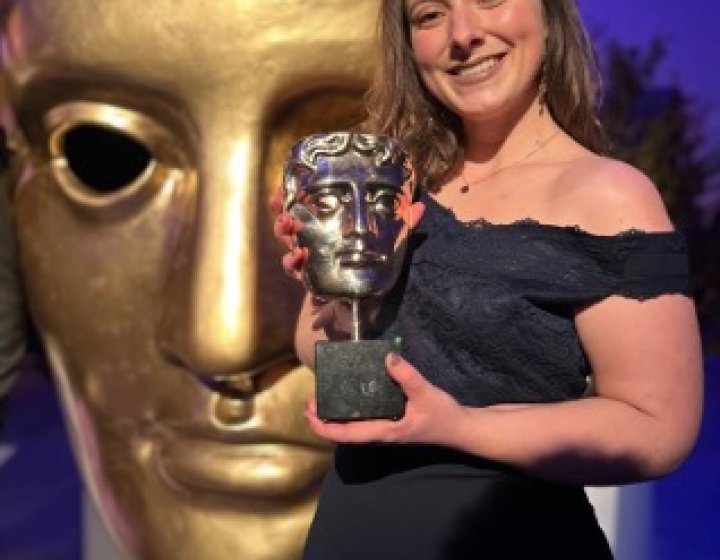
Graduate Spotlight: A journey from Falmouth University to a BAFTA Award
05 June 2024
Catherine Hillier graduated from Falmouth University with a BA in Music in 2018, and her career has ...
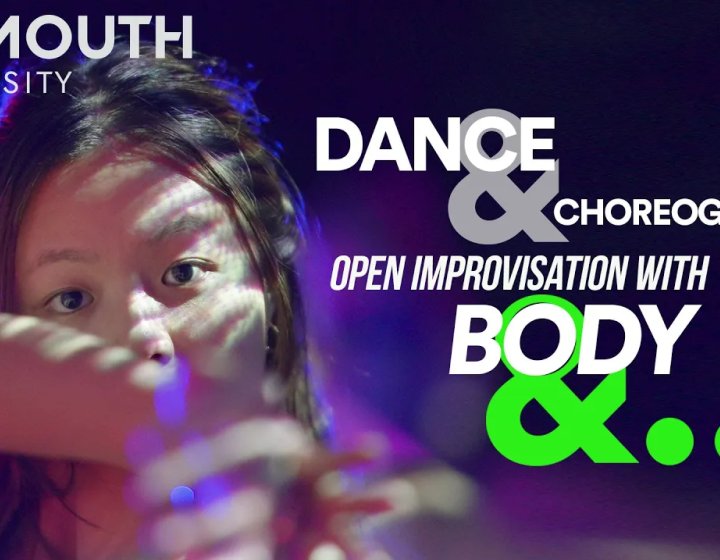
How collaboration fuels creativity for our Dance community
10 April 2024
The regular 'Body &' events, run by the Dance & Choreography BA course team, offer students studying...
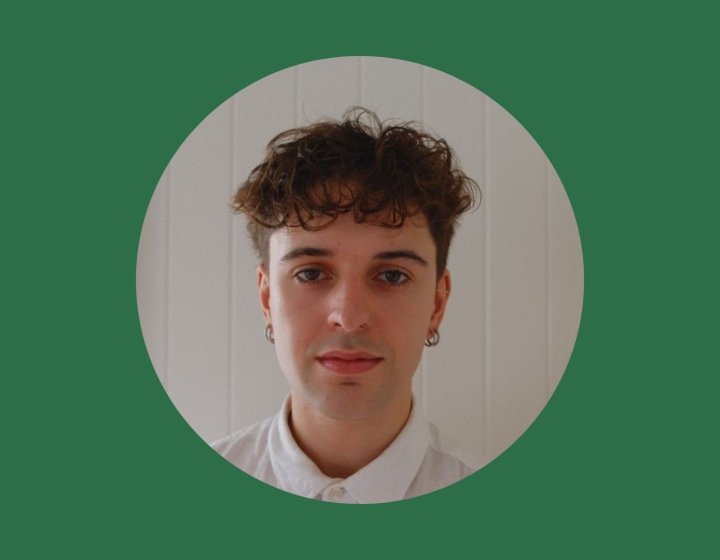
Creative Music Technology graduate joins one of Australia's leading media companies
27 March 2024
Elliot Orban has recently joined Southern Cross Austereo (SCA) as their Assistant Network Operation ...
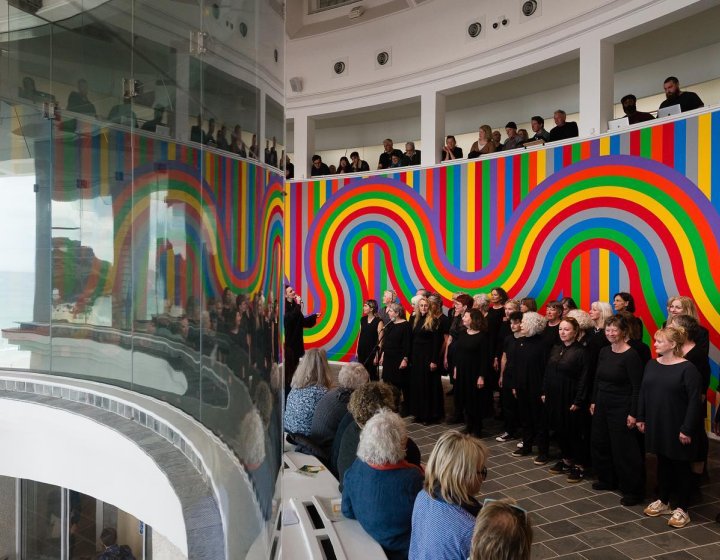
Lecturer's show shortlisted for Cornwall Heritage Awards 2024
21 December 2023
'Re:voice', a show directed by senior lecturer Agnieszka Blonska, has been shortlisted for the Corn...
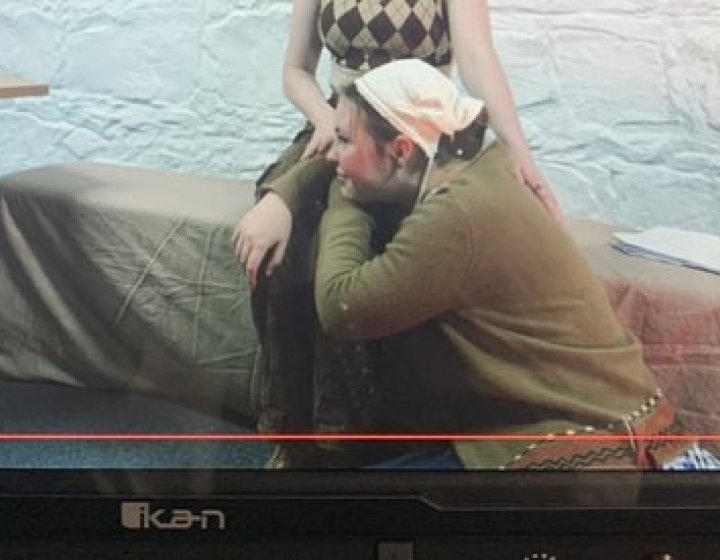
Why I chose to study Acting BA(Hons) at Falmouth
18 December 2023
Acting student Rebecca talks about why she chose to study acting and why Falmouth was the right Univ...
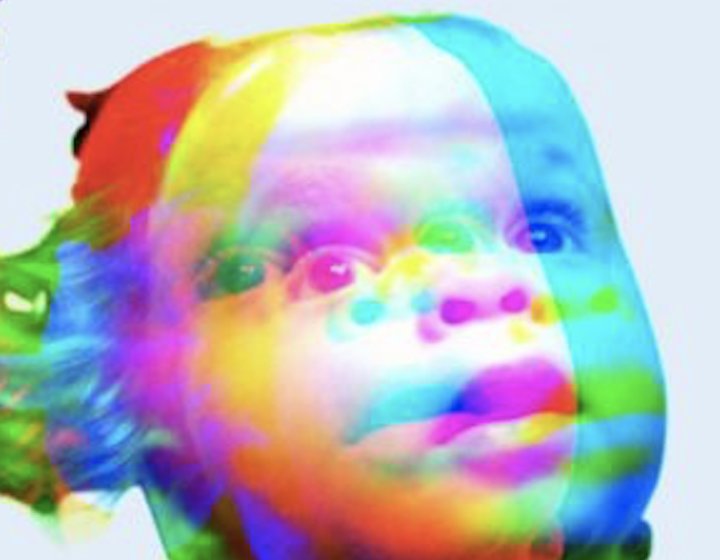
A Child of Science: Falmouth Lecturer’s new play tells the brilliant story of the creation of IVF
13 November 2023
Bruntwood Prize-winning writer Gareth Farr’s new play A Child of Science tells the story of Patric...
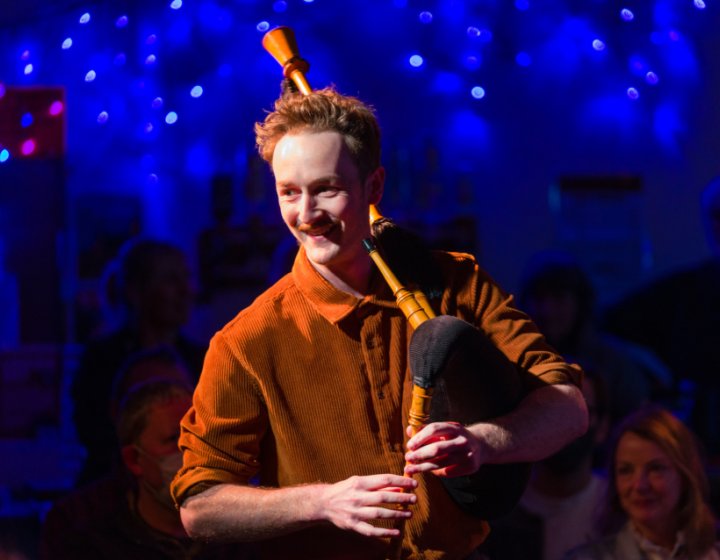
Photo credit: Steve Tanner
'Help! I Think I'm a Nationalist': Show directed by Falmouth lecturer scores 5-star reviews
03 October 2023
A critically acclaimed show directed by senior lecturer Agnieszka Blonska and written and performed ...

Image by: Steve Tanner
‘Come Out Fighting’: Falmouth graduates star in new play from What Now Productions
29 September 2023
Acting BA(Hons) graduates star in new play exploring suppressed sexuality and homophobia within the ...
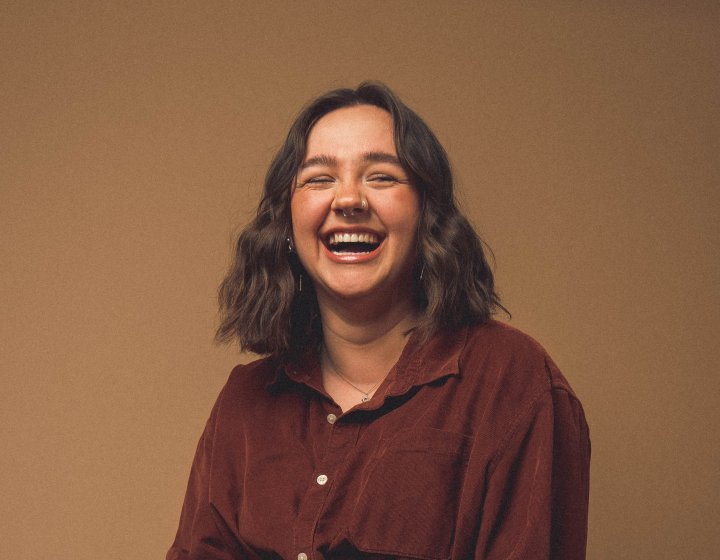
In conversation with aspiring stand-up comedian Hayley Ashton
22 June 2023
Third-year Acting student reflects on their time at Falmouth University.
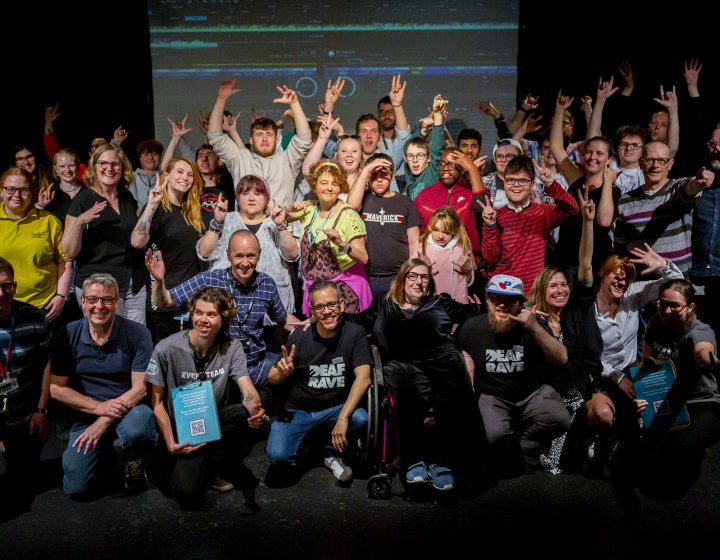
Harnessing technology to make live events more inclusive
05 June 2023
In May 2023, the Live Audience Accessibility & Augmentation knowledge exchange project hosted a seri...
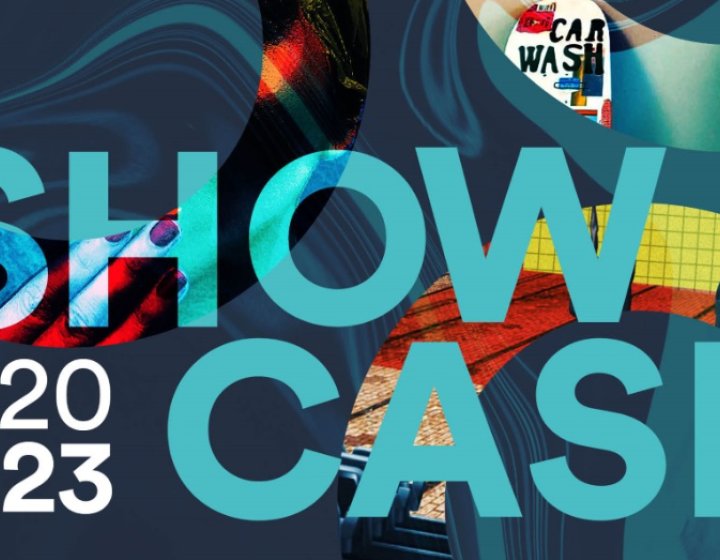
Falmouth Showcase 2023: A celebration of our graduating talent
02 June 2023
Congratulations to our class of 2023!
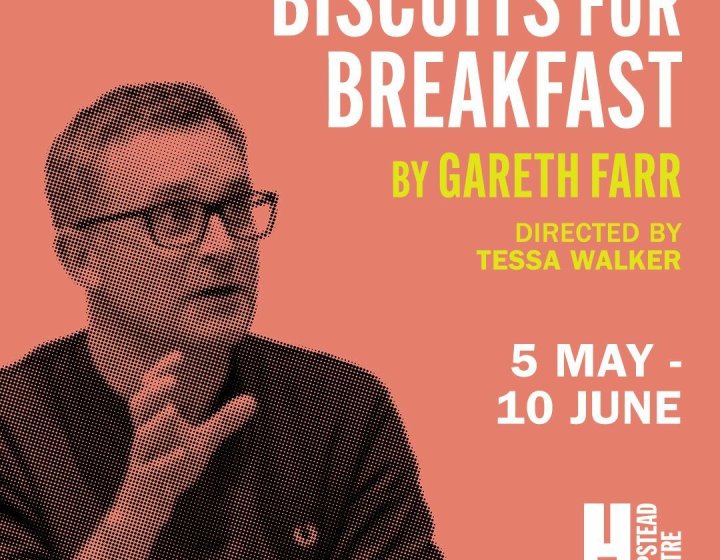
Biscuits for Breakfast: Lecturer's new play makes an impact beyond the stage
09 May 2023
While writing his new play, Acting lecturer Gareth Farr began a collaboration with a local chef and ...
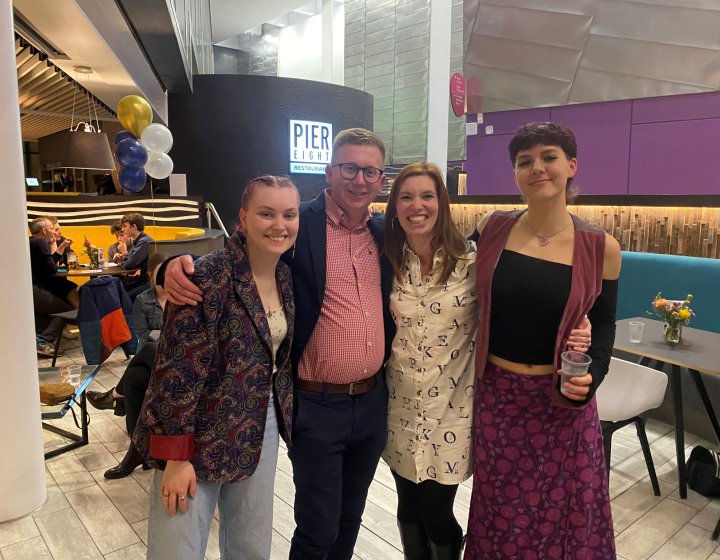
Falmouth dancers join Sadler's Wells National Youth Dance company
28 April 2023
Two dancers from AMATA’s youth dance programme have joined the National Youth Dance Company.
How you'll learn & be assessed
Alongside lectures and practical workshops, you'll receive academic, technical and artistic guidance from staff and specialists. Lectures will introduce you to key information, concepts and examples. Workshops enable you to apply the ideas to your own practice and develop your skills through practical exercises. Seminars and tutorials facilitate deeper discussion and questions around lectures, workshops and assessment briefs. These also involve giving feedback on your work towards module assessments.
As you progress through the course, you will have more flexibility in terms of what you choose to study, who you collaborate with and how you respond to the assessment briefs.
At Falmouth, we use a 'digitally enhanced learning and teaching' approach. Your experience will always be predominantly in-person. Video materials and online meetings are used where there is a clear advantage to do so, for example short one-one meetings or instructions on using the recording studios. You can read more here.
There is a variety of assessment methods used on this course. These all have relevance to professional practice and include:
- Portfolios of practical work.
- Learning journals documenting your work using text, video, photos and audio recordings.
- Written assignments such as project reports, essays and, in the final year, a dissertation.
- Presentations
- Studio-based assessment of practical work.
Staff
You’ll learn from composers, performers, producers, sound artists, sound designers, audio engineers, and musicologists, as well as our associate leading instrumental tutors, composers and songwriters. What’s more, our industry contacts range from Yamaha to Island Records to the Philharmonic Orchestra. Our regular industry guest lecturers have included producer Gil Norton (Foo Fighters, The Pixies, Patti Smith), Eric James (Philosopher’s Barn Mastering), Jana Winderen, and Robert Curgenven.
Some members of staff only teach on specific modules, and your course might not feature every staff member who teaches on the course.
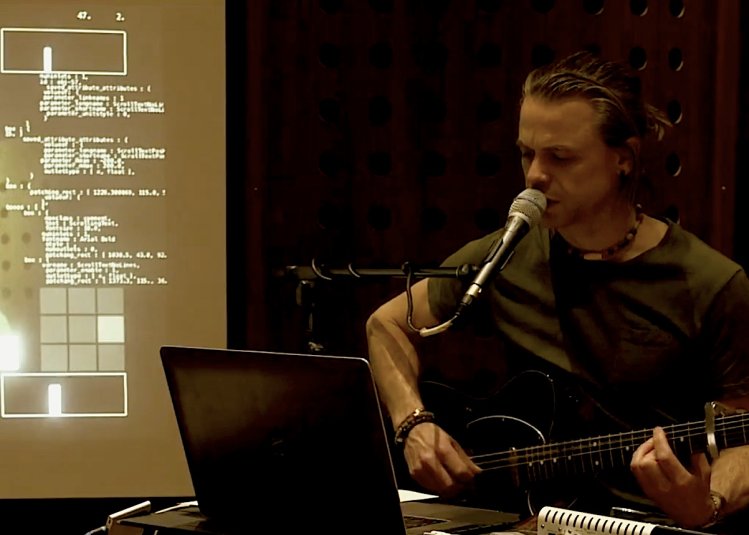
Dr Simon Waite
Course Co-ordinator & Senior Lecturer
Si Waite is a songwriter, producer and educator. He has written, recorded and performed as a solo ar...
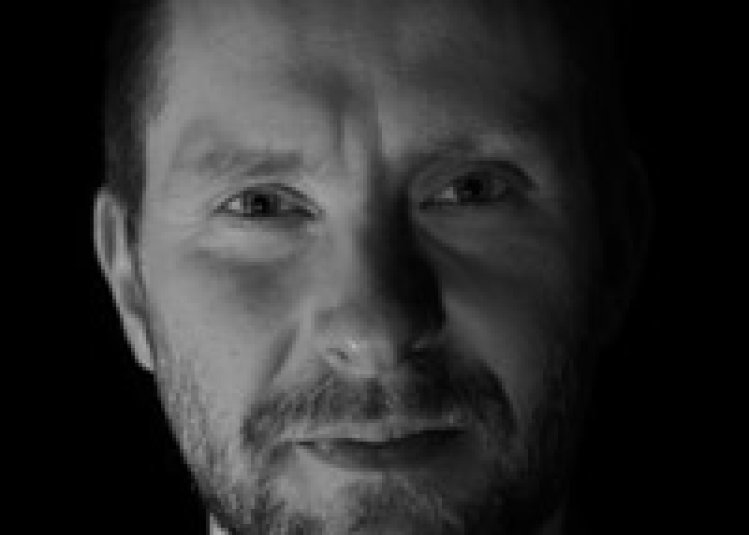
Dr Antti Saario
Head of Music
Dr Antti Sakari Saario is an award-winning post-acousmatic composer, sound and audio practitioner, r...
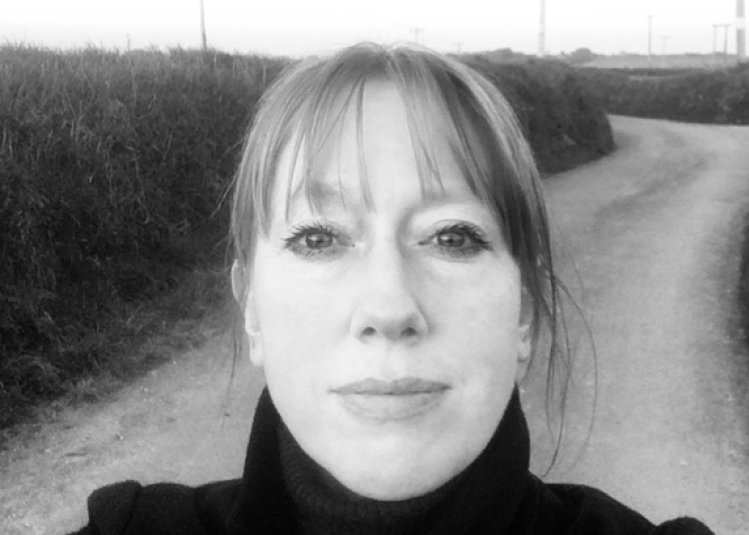
Dr D Ferrett
Associate Professor in Music, Sound and Culture
Dr D Ferrett is Associate Professor of Music, Sound and Culture and the Research Lead for the Academ...
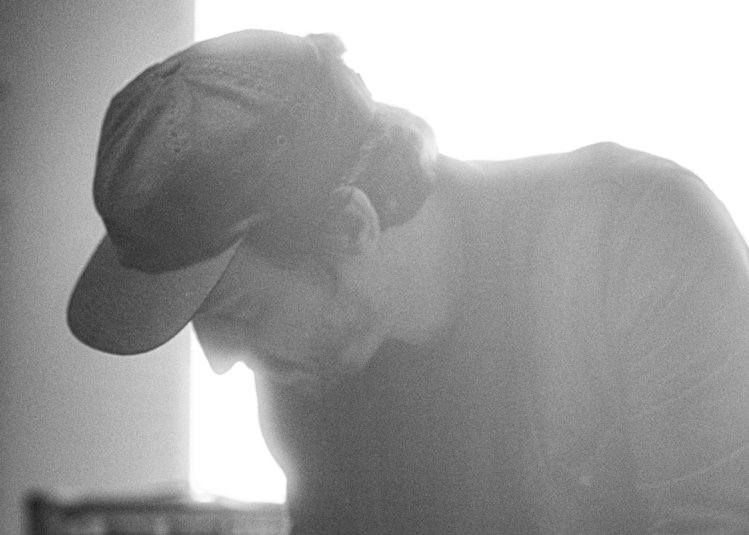
Will Parker
Lecturer in Music and Sound
Will Parker is a composer, artist, researcher, and educator specialising in audio-visual creation, i...
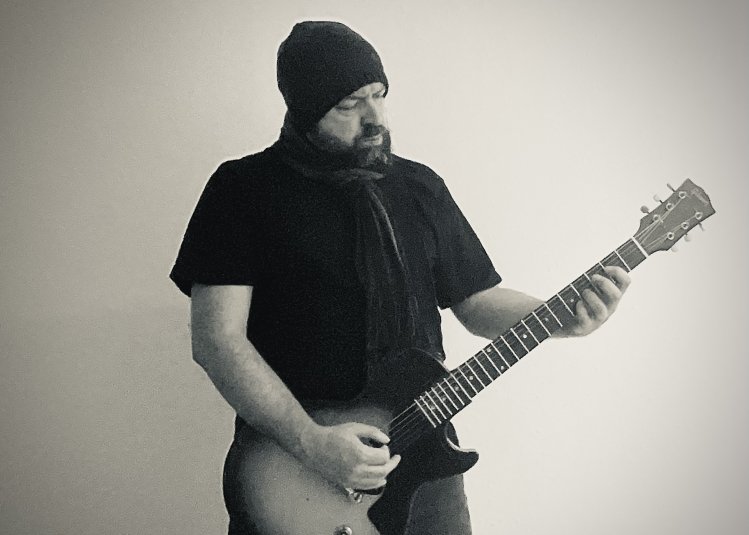
Sam Murray
Senior Lecturer in Music
Sam Murray is a guitarist, composer, music director and educator with over 25 years experience in th...
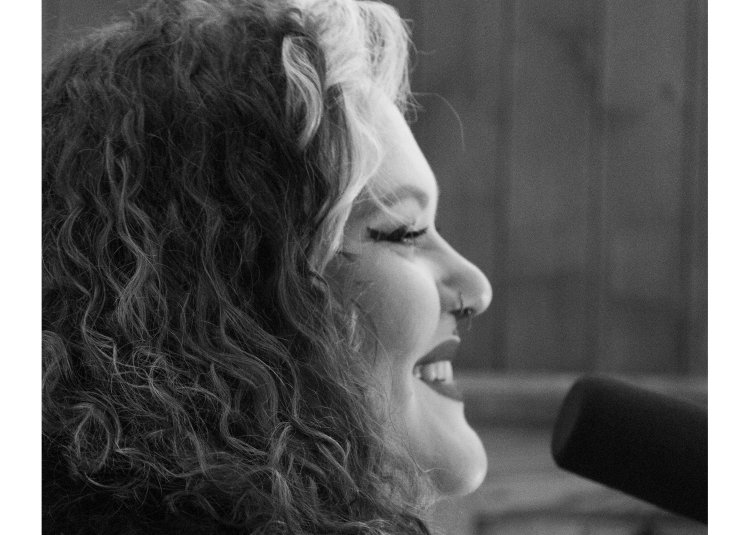
Frankie Stevens
Lecturer in Music
Frankie Stevens is an operatic soprano, metal musician and scholar. She has a diverse range...
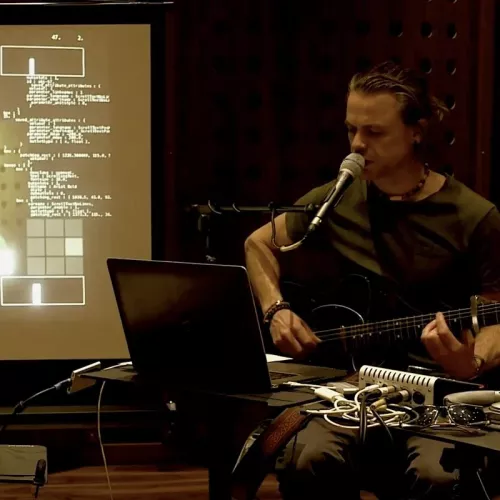
Got a question about this course?
If you want to know more about the course structure, our application requirements or what our graduates have gone on to achieve, our friendly course team is here to help.
Chat to SimonCareers
This Creative Music Technology degree will prepare you for a wide range of career opportunities, including:
- Musician
- Music producer
- Sound engineer or designer
- Audio editor
- Media composer
- Location sound recordist
- Digital artist
- Music industry professional (e.g., label management, events management)
- Music educator
- Digital content creation
Research methods, critical thinking and development of specialist skills embedded throughout the modules could allow you to successfully progress into postgraduate study in related fields.
Whether you want to perform on stage or behind the scenes, a degree in Music combines specialist teaching with entrepreneurial skills in self-promotion to prepare you for industry.
How to apply
Ready to apply for 2026?
You can apply for our undergraduate degrees via UCAS. You'll need our university UCAS code (F33) as well as your course code (which you'll find on your course page) for your application.
Applying as an international student?
There are a number of different ways to apply to study at Falmouth as an international student. Find out how you can become part of our creative community.
| Course route | UCAS code |
|---|---|
| Creative Music Technology BA(Hons) three year degree | W390 |
| Creative Music Technology BA(Hons) with professional placement | PY02 |

Application advice & interview information
Go to ToolkitFor starting your studies in 2026
UK applications: 14 January 2026 (for equal consideration)
Applications after the 14 January will be considered on a first-come, first-served as long as there are places available. Apply for this course now.
For starting your studies in 2027
UK applications: 13 January 2027 (for equal consideration)
International fee payers
International fee payers can apply throughout the year. But we recommend applying as early as possible, to make time for visa and travel arrangements.
We consider all applications on their own individual merit and potential.
Our diverse community is creative, innovative and entrepreneurial. We recognise that these qualities aren’t always shown in academic grades alone. That’s why, while many of our applicants achieve high academic grades, we also welcome those who can demonstrate their potential through an exceptional portfolio or performance.
We welcome applications from all subject backgrounds, whether you’ve specialised in STEM, the arts or humanities. Find out more about our Entry Requirements here.
Course routes & entry requirements
BA/BSc(Hons) three year degree: minimum 64 UCAS Tariff points
BA/BSc(Hons) four year degree with professional placement: minimum 64 UCAS Tariff points
At Falmouth, we'll consider the equivalency of your specific qualifications against our entry requirements and support you through your application journey.
View our International Entry Requirements
Language requirements
For applicants whose first language is English we require you to have or be working towards GCSE English Language Grade 4 (C), or equivalent.
If English is not your first language you will need to meet the same standard which is equivalent to the IELTS Academic 6.0 overall score, with at least 5.5 in Reading, Writing, Speaking and Listening. We accept a range of in country equivalencies and approved tests.
If you need a student visa to study in the UK, you may need to take a recognised language test. You can read our English Language Requirements for more information.
What we're looking for
This Creative Music Technology degree is for students who wish to study the creative use of a range of music and audio hardware and software to produce music, sound art and sound design.
We are looking for applicants who are passionate about music and sound in a variety of genres and want to explore the creative potential of music technology. You may already have studied music and be creating and/or producing music using typical music production software but may also come from a more traditional music-making background, having developed your skills in your own time.
Above all you will be motivated to expand your creative practice through learning new techniques, working with new hardware and software and collaborating with others.
Fees, costs & funding
Tuition fees
| Annual tuition fee | Student |
|---|---|
| £9,790 per year | Full-time UK |
| £19,950 per year | Full-time EU/international |
| £1,955 per professional placement year | Full-time UK and EU/international |
| Annual tuition fee | Student |
|---|---|
| £9,535 per year | Full-time UK |
| £17,950 per year | Full-time EU/international |
| £1,905 per professional placement year | Full-time UK and EU/international |
Tuition fees for September 2027 will be confirmed in summer 2026.
Tuition fees are set annually and are subject to review each year. The University may therefore raise tuition fees in the second or subsequent years of a course, in line with inflation and/or the maximum permitted by law or Government policy. Students will be notified of any changes as soon as possible.
The figures above don't include accommodation and living costs
Typical course costs
Computers & DAWs: A computer running a suitable Digital Audio Workstation such as Ableton Live, Logic, FL Studio, Pro Tools, Reaper or Bitwig will be essential. A laptop rather than a desktop is highly recommended. If you need further guidance on computers and software then please speak to the course team during induction week.
Instruments: All of our practice studios are equipped with a piano or keyboard, amplifiers, PA and a drum kit. Drummers should bring their own sticks, cymbals, and snare. Other instrumentalists must bring their own instrument with them, and budget for any expendables relating to your specific instrument such as strings, plectrums and leads.
Headphones: You can book headphones from AMATA’s Technical Resource Stores, however a pair of good quality, open-back headphones are recommended for regular studio and production work. Prices vary but expect to pay upwards of £80-£100. If you are not sure what you need, search the Internet for ‘studio monitor headphone review’.
Ear protection: Your ears are the most important pieces of audio kit you will ever own! Looking after them is therefore top priority. Dispensers with free disposable foam earplugs are situated outside the practice and performance studios throughout the AMATA building, but it is also recommended that you purchase high quality earplugs - especially if you play in a loud group or attend gigs and/or clubs.
Backups: Backing up your work is essential. You will have access to online storage via Microsoft OneDrive but a physical drive may also be useful for additional security or when Internet upload speeds are slower than they are on campus.
Software: You will have free access to Microsoft Office software throughout your time at Falmouth.
Note taking: You may wish to use your laptop for note taking. However, if you prefer pen and paper, then we would suggest spending around £10 on pens and notepads / journals.
Course equipment and costs
- Computers & DAWs
A computer running a suitable Digital Audio Workstation such as Ableton Live, Logic, FL Studio, Pro Tools, Reaper or Bitwig will be essential. A laptop rather than a desktop is highly recommended. If you need further guidance on computers and software then please speak to the course team during induction week.
- Instruments
All of our practice studios are equipped with a piano or keyboard, amplifiers, PA and a drum kit. Drummers should bring their own sticks, cymbals, and snare. Other instrumentalists must bring their own instrument with them, and budget for any expendables relating to your specific instrument such as strings, plectrums and leads.
- Headphones
You can book headphones from AMATA’s Technical Resource Stores, however a pair of good quality, open-back headphones are recommended for regular studio and production work. Prices vary but expect to pay upwards of £80-£100. If you are not sure what you need, search the Internet for ‘studio monitor headphone review’.
- Ear protection
Your ears are the most important pieces of audio kit you will ever own! Looking after them is therefore top priority. Dispensers with free disposable foam earplugs are situated outside the practice and performance studios throughout the AMATA building, but it is also recommended that you purchase high quality earplugs - especially if you play in a loud group or attend gigs and/or clubs.
- Backups
Backing up your work is essential. You will have access to online storage via Microsoft OneDrive but a physical drive may also be useful for additional security or when Internet upload speeds are slower than they are on campus.
- Software
You will have free access to Microsoft Office software throughout your time at Falmouth.
- Notetaking
You may wish to use your laptop for notetaking. However, if you prefer pen and paper, then we would suggest spending around £10 on pens and notepads / journals.
Funding
For information about funding available, please visit our student funding pages.
Ask a student
What better way to find out about life at Falmouth University than by asking our current students?
From course details and academic support, to the social scene and settling in, our students are ready and available to answer any questions you might have. Simply set up your account, send them a question and they'll get back to you within 24 hours.
Similar courses
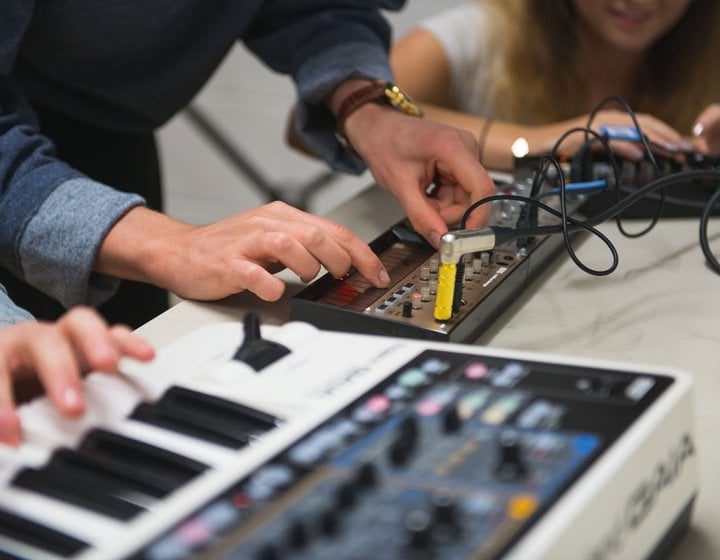
Sound Design BA(Hons)
Explore the boundaries of sound and its potential to transport an audience in different contexts, fr...
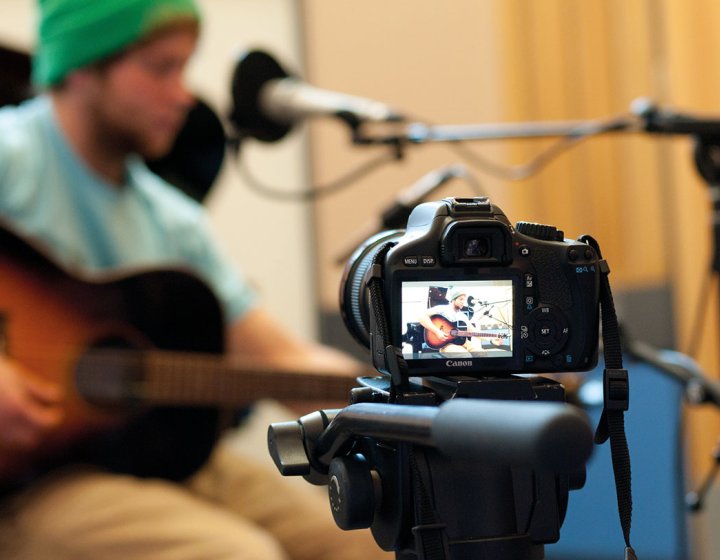
Music Business BA(Hons)
Get ready to shape the music business by mastering the skills needed to manage, create and innovate....
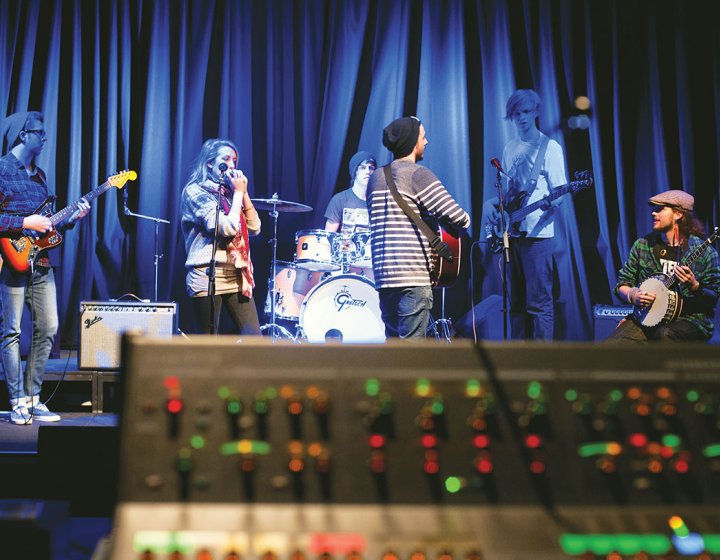
CertHE Music Courses
Take your first steps towards becoming a skilled creative music artist with one of our three CertHE ...
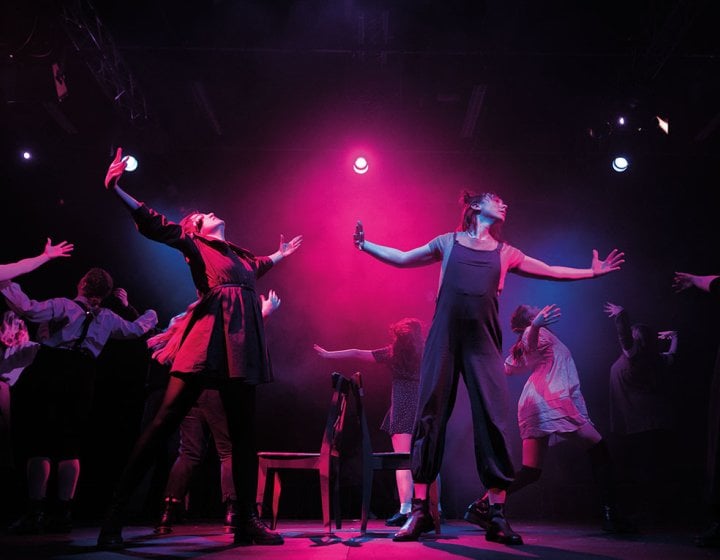
Musical Theatre BA(Hons)
Combining training in acting, singing and dance, this practice-led degree will empower you for a car...
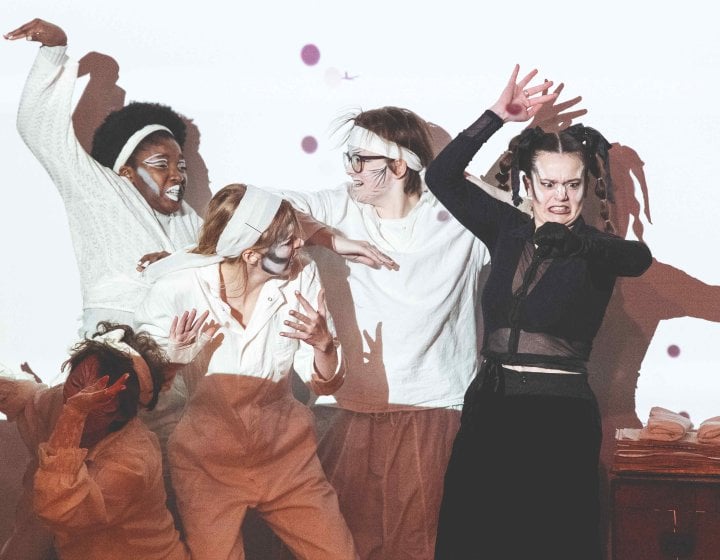
Theatre & Performance BA(Hons)
Embrace a world of opportunity to become an original and distinctive theatre maker and performer. As...
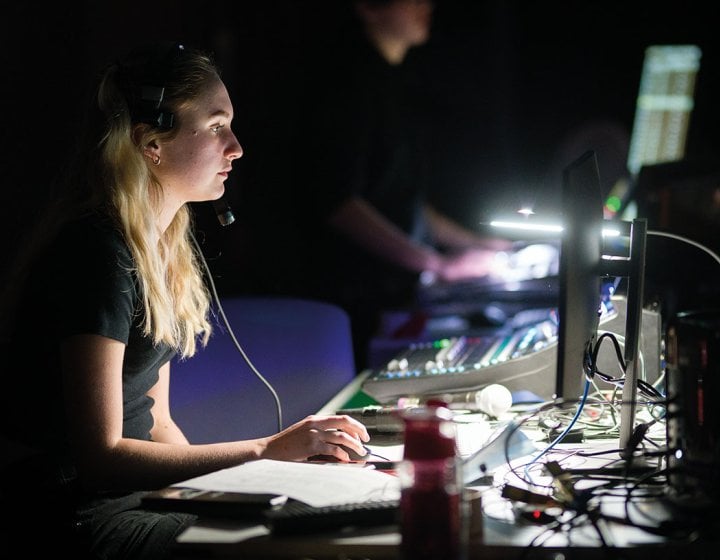
Technical Theatre Arts BA(Hons)
This course will provide you with the practical knowledge and skills needed to succeed in the exciti...
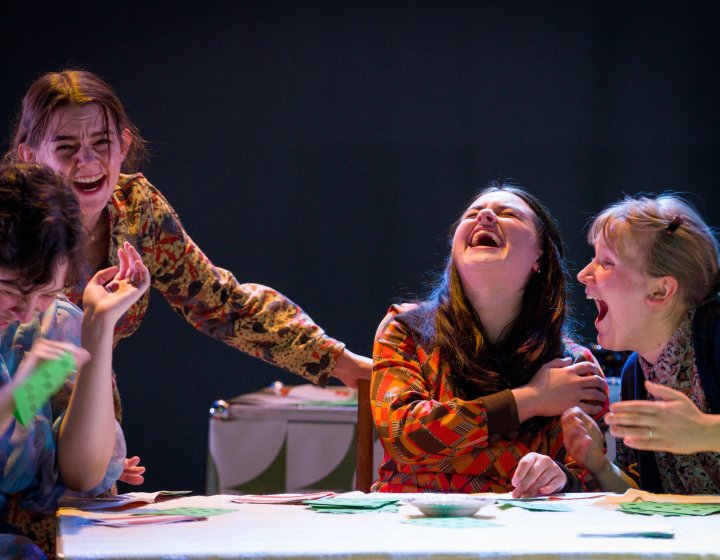
Acting BA(Hons)
Push boundaries to become a progressive actor in a highly creative and collaborative environment. Ba...
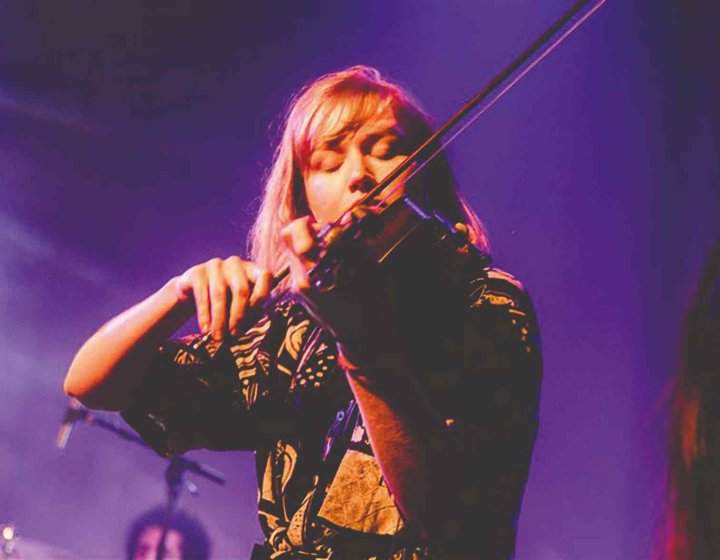
Music BA(Hons)
Prepare for a career as a professional musician with this industry-focused music degree. Based withi...
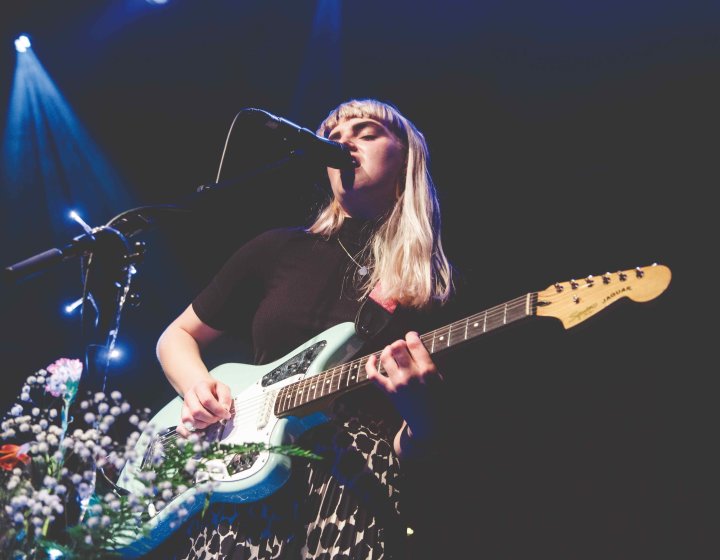
Popular Music BA(Hons)
Whether it’s underground or mainstream, DIY or commercial, acoustic or electric, this course is fo...
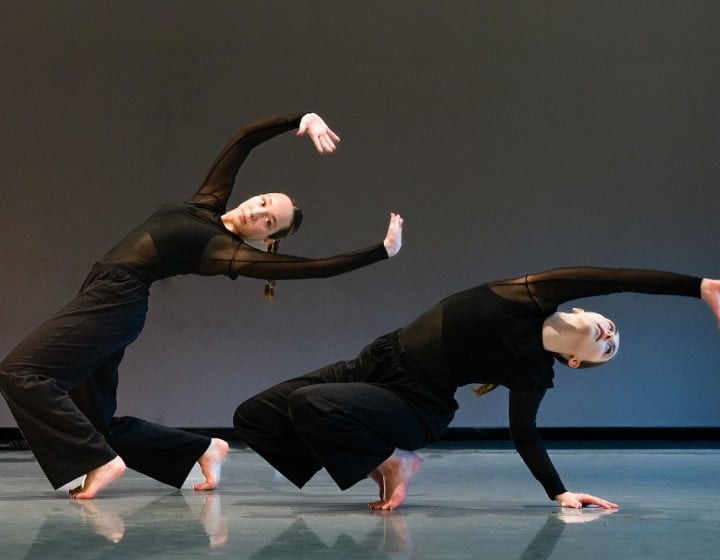
Dance & Choreography BA(Hons)
Launch your career as a dancer and an artist with this skills-focused dance degree. You’ll train i...
Open Days and events
From visiting campus to online application advice, get all the information you need about joining our creative community.
Find an event
